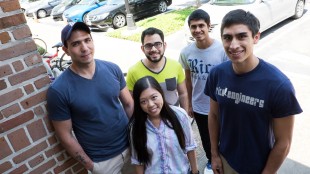NEWS RELEASE
David Ruth
713-348-6327
david@rice.edu
Taking the hassle out of parking
It’s a pain we all know: trying to find a parking spot in a crowded lot, from shopping centers to medical complexes to the airport. A Rice University team of senior electrical and computer engineers designed a capstone project that could allow all of that to change with a new parking technology called “ParkiT.”
The new system is cheaper than sensor technology currently being used and would provide parking lot managers and attendants information in real time about exactly where open spots are. That information could then be shared with drivers through electronic signs or a driver-friendly app.
“Parking is something we’ve all struggled with,” said Jennifer Ding, a ParkiT team member. “We’ve all been there driving around circling and circling, and just when you think you’ve found a spot, it’s a Mini Cooper.”
The team’s goal is to take that hassle out of parking for everyone — the driver and the parking lot operator.
“We created a new technology that can identify where open spaces are located,” Ding said. “Being electrical engineers, we decided to take a different route from sensors and use cameras and computer vision. Our cameras overlook large parking lots with 50 to 100 or more spaces.”
“The camera takes a picture of the lot every minute,” said Omar Turk, also a ParkiT team member. “The camera then sends the picture to a server, where we process it with some computer vision and machine-learning algorithms. When we get the results, we display it on a user interface for the parking lot operator to see.”
Once the lot operator has access to the information, they can pass it along to the driver through digital signage pointing to open spaces or via a mobile app.
Along with Ding and Turk, the members of ParkiT include Andres Cedeno, Sean Peters and Aneesh Sampath.
“Right now there’s no cost-effective outdoor solution for detecting parking spots … and they’re not very accurate,” Cedeno said. “This is detrimental because operators don’t really know what’s going on with their lots. They don’t know the occupancy rate when it’s filling up, and that’s really frustrating for drivers because they can’t find a spot — and operators know this.”
Current technology uses sensor systems that cost about $400-$800 per parking spot, and they have to be installed into the pavement. ParkiT’s system would cost lots less than $50 per space.
But what about GPS?
“There are GPS parking locators out there, but they’re mostly useful once you’ve parked and you can record where you are,” Cedeno said. “GPS really can’t tell you where there are cars at any given point.”
The project came about in early 2013 when Ding and other students brainstormed their idea at Rice’s 3-Day Startup, which hosts workshops and a competition on creating a new business and pitching it to investors.
In the summer of 2013, the team participated in Rice OwlSpark’s first accelerator program. OwlSpark is a startup accelerator designed to help teams turn their business ideas into companies, develop a product or service to sell, work on a plan to make the business a reality and learn real-world skills, such as product pitching and product-market fit. Along with helping participants develop their businesses, the 12-week program also provides an entrepreneurship-focused curriculum.
At OwlSpark, teams present their plans to potential investors, venture capitalists, “angel investors,” Rice faculty, staff and students and to business leaders from Greater Houston.
The team has consulted with various Houston-area parking facilities, including the Texas Medical Center and Houston Hobby Airport.
“We’ve heard from some of the places we’ve consulted with that they could increase their sales in contract parking by 10-20 percent just by knowing when and how much they fill every day,” Cedeno said.
“We’ve heard from some of the places we’ve consulted with that they could increase their sales in contract parking by 10-20 percent just by knowing when and how much they fill every day,” Cedeno said.
Ding said that speaking with different parking operators throughout Houston “was really exciting” because of “the potential they saw in this technology.”
After graduating in May, Ding and three Rice engineering students will take the project forward and create a company to develop ParkiT further.
“The plan is to install several trials throughout Houston this summer,” Ding said. “If we can prove the value of this technology, we would hopefully spread throughout the city … and who knows, maybe beyond that to throughout the country.”
The team’s faculty advisers are Gary Woods, professor in the practice of computer technology, and Ashutosh Sabharwal, professor of electrical and computer engineering.
-30-
Video:
http://youtu.be/BfHNaurzFQM


